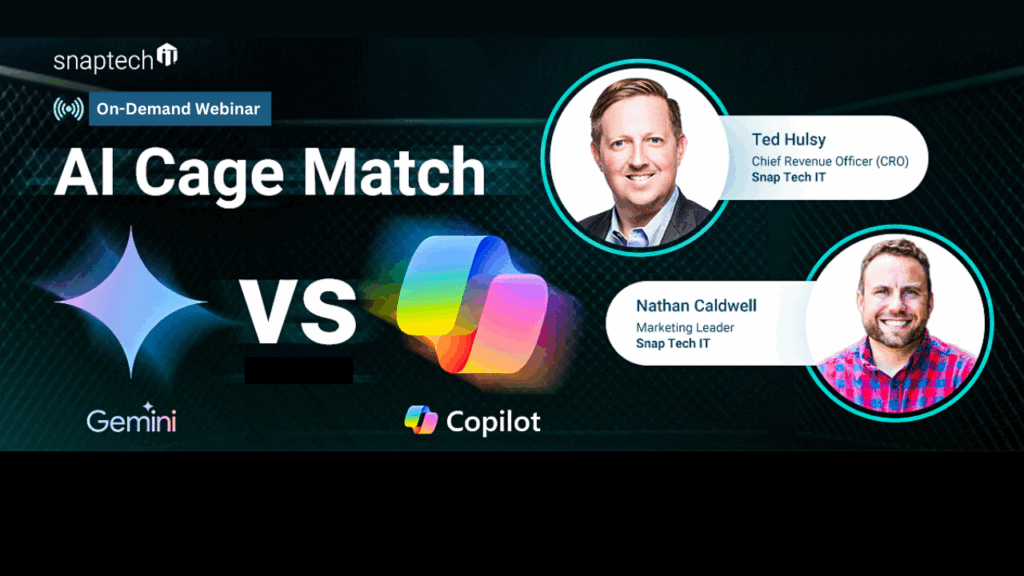
AI Cage Match: Google Gemini VS Microsoft Copilot
Keeping up with the latest AI tools can feel like a full-time job. In this head-to-head showdown, we pit Google Gemini against Microsoft Copilot to see which AI assistant delivers the best real-world results. In a recent webinar, SnapTech IT’s marketing manager, Nathan Caldwell, and host Ted Hulsy, CRO for Snap Tech IT, compare and share the functionality of Google Gemini vs Microsoft Copilot.
- Recording and Transcribing Meetings
🏆 Verdict: Tie
Google Gemini (via Google Meet) allows users to record meetings, generate transcripts, summaries, and to-do lists. Transcriptions come with hyperlinked timestamps and actionable items with checkbox functionality—making post-meeting follow-ups easier and more structured.
Microsoft Copilot, integrated into Teams, offers transcription, recording, summarization, and action extraction. A unique strength is its ability to take that transcript and immediately generate derivative content like a blog post in Word using the Copilot prompt system. This functionality is particularly useful for capturing and reusing subject matter expertise from leadership meetings.
Conclusion: Both platforms provide strong transcription and summarization capabilities, with Copilot edging forward in content repurposing, while Gemini excels in meeting follow-up UX.
2. Creating Presentations
🏆 Winner: Microsoft Copilot
Microsoft Copilot in PowerPoint can generate a full slide deck from a single prompt. It creates an outline you can rearrange and approve, then generates 10–20 slides in one go. It also offers image suggestions, design options via Designer, and integrates seamlessly with documents to auto-create presentations from blogs, meeting transcripts, or reports.
Google Gemini, embedded in Google Slides, is limited to one-slide-at-a-time generation. While it provides high-quality bullet points and strong image generation capabilities, the lack of full-deck automation significantly slows down workflows.
Conclusion: Microsoft delivers a productivity leap in this category, helping users get to a polished presentation faster.
3. Email Assistant
🏆 Winner: Microsoft Copilot
Google Gemini provides basic drafting assistance within Gmail. Users can prompt it to generate emails and slightly adjust tone (shorten, elaborate, formalize), but editing options are minimal. This is ideal for users who want simplicity, but may frustrate those needing customization.
Microsoft Copilot in Outlook shines with its robust prompting controls: change tone, adjust formality, summarize threads, insert bullet points, and even format for SEO. It enables complex rewriting and interactive iteration to fine-tune your messaging.
Conclusion: Microsoft Copilot wins for offering a more dynamic and flexible email assistant.
4. Completeness of Productivity Platform
🏆 Winner: Microsoft Copilot
Microsoft has embedded Copilot into every app across Microsoft 365—Word, Excel, Outlook, Teams, PowerPoint—ensuring AI support is native and immediately available without switching contexts.
Google Gemini is being integrated across Docs, Sheets, Meet, and Slides, but functionality varies by tier, and depth of integration doesn’t match Microsoft’s maturity or breadth yet.
Conclusion: Microsoft’s end-to-end Copilot integration gives it a clear advantage in platform completeness.
5. Image and Video Creation
🏆 Winner: Google Gemini
Google Gemini stands out in photo-realistic image generation within Slides. It produces high-quality, creative visuals on-demand without licensing concerns—ideal for educational or public presentations.
Microsoft Copilot, while functional, often produces unreliable or awkward image results, particularly with public figures. Image retrieval and generation still need improvement, as illustrated by its struggle to find usable images of Dolly Parton.
Conclusion: Google wins with superior AI-generated visuals that are high quality and licensing-safe.
6. Richness of AI Platform
🏆 Winner: Google Gemini
Gemini’s dedicated platform at gemini.google.com and its advanced version (“Gemini Advanced”) offer a more flexible, exploratory interface. It supports varied model versions, code execution, file uploads, and web browsing—comparable to ChatGPT Premium.
Copilot offers a similar interface in the free web version and chat format, but lacks the depth and customization Gemini offers for advanced users and developers.
Conclusion: For those who want more than just embedded AI, Gemini delivers a richer standalone experience.
7. Value
🏆 Winner: Google Gemini
Gemini is included in most Google Workspace Standard and Plus plans at no additional cost (starting at $14–$22/user/month), making AI accessible to more users by default.
Microsoft Copilot for Microsoft 365 costs an additional $30/user/month, on top of Microsoft 365 licensing. While powerful, the added cost is significant and may be a barrier for smaller teams.
Conclusion: Google leads on value by democratizing access to AI across its Workspace tiers.
Google Gemini VS Microsoft Copilot Results

Final Thought:
If you’re deeply embedded in Microsoft 365, Copilot delivers the most seamless and powerful AI augmentation—especially for professionals creating documents, presentations, and emails daily.
However, if you’re looking for cost-effective access to advanced AI with excellent visuals and creative tooling, Google Gemini is hard to beat.
Whether you’re choosing Google Gemini, Microsoft Copilot, or another AI solution like ChatGPT for Business, the reality is, AI is now a necessity.
All businesses need to find the right AI assistant to help them optimize efficiency, reduce workload, and outpace competitors.
If you’re not sure where your business can start with AI, we’re happy to help!

Nathan Caldwell
Marketing expert, thought leader, speaker, and security awareness solution creator.